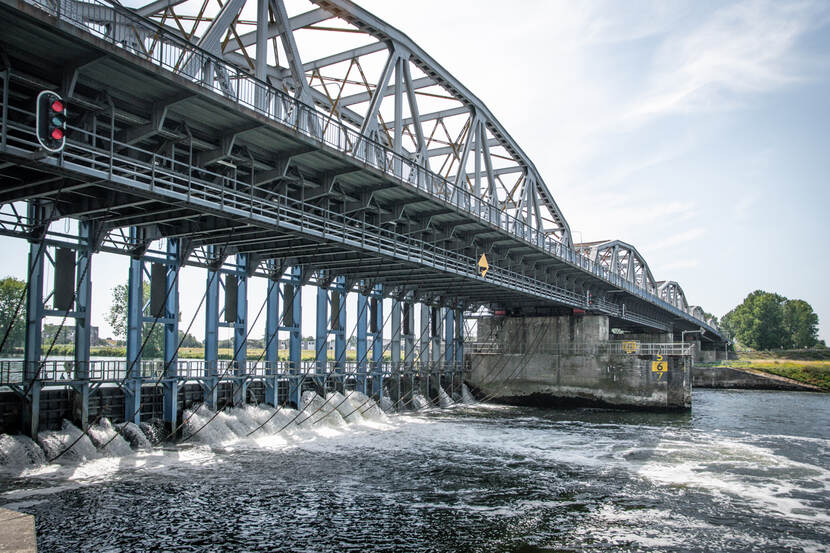Delta Programme 2021: Accelerating and intensifying in order to achieve the goals for 2050
In the years ahead, we will be facing a major challenge in terms of achieving our flood protection, freshwater availability, and spatial adaptation goals by 2050. This is what the revised Delta Programme 2021 states. Delta Programme 2021 shows that we are still on the right track, yet we need to give impetus to the implementation of measures. This urgency is confirmed by successive years featuring periods of drought and heat as well as frequent torrential rain.

Today, on behalf of the Cabinet, the Minister of Infrastructure and Water Management presented Delta Programme 2021 – comprising the revised Delta Decisions, Regional Preferential Decisions, and concrete measures in the fields of flood risk management, freshwater availability, and spatial adaptation – to the House of Representatives. Delta Programme 2021 has been established under the direction of Delta Programme Commissioner Peter Glas, in collaboration with the district water boards, the municipalities, the provinces, and the central government.
Urgency is increasing
In his cover letter, the Delta Programme Commissioner states that the urgency of working on flood risk management, freshwater availability, and spatial adaptation is increasing. This is due to the changing climate, but also because such investments are especially crucial now, to sustainably foster our economy and to enhance the resilience of our society. ‘Although 2050 is still 30 years away, we have little time to lose, because the taskings are huge,’ Delta Programme Commissioner Peter Glas explains. He is calling on the managers of flood defence systems and other parties involved to give their all to the pursuit of the flood protection goals. In addition, he puts an urgent request to the Cabinet to prevent the COVID-19 crisis from stagnating the work on the delta as a result of a potential lack of funding.
Furthermore, the Delta Programme Commissioner requests attention to be paid to the climate-proofing of vital and vulnerable functions. Such efforts must be intensified. Delta Programme Commissioner Peter Glas: ‘In recent months, we have experienced, more than ever before, how important it is for our vital sectors such as health care, IT, and the power, gas, and drinking water supply, to continue to operate during a crisis. Measures to climate-proof vital and vulnerable functions must be intensified.’
Review and progress of the Delta Programme
The Delta Programme pursues an adaptive approach, involving amendment of the Delta Decisions and Preferential Strategies if new developments and insights so dictate. Delta Programme 2021 comprises the results of the first review since the commencement of the programme. The Delta Decision on Freshwater Supply shows a particular need for fine-tuning. Furthermore, additional attention must be paid to the pace at which the measures are being implemented, with a view to achieving the goals by 2050. In addition, it is important that we already look farther ahead, to the period beyond 2050. After 2050, the rising sea level may add considerably to the water taskings, necessitating difficult and potentially far-reaching decisions. The parties involved must take this into consideration when taking decisions in the next few years, and already prepare for the major choices that may need to be made after 2050. During the next six years, a great deal of research and preparatory work will need to be performed. Options to re-design our country and potential measures that we will need to take in the future in order to prepare our country for this accelerated rise in sea level are being explored in the Sea Level Rise Knowledge Programme.
Water must become directive with respect to spatial planning choices
Delta Programme 2021 focuses a great deal of attention on the interconnectivity between spatial planning and water. The water taskings will need to be more directive and indicate preconditions regarding the choices to be made with respect to spatial planning in the Netherlands. More so than in the past, we need to factor in drought, heat, waterlogging, and flood risks in the spatial planning of our country and in choices regarding land use. This means, for example, that major water-consuming activities such as the cultivation of certain crops must preferably not be undertaken in areas that are prone to drought. Furthermore, climate change must be taken into account in the selection of locations for and the spatial planning of new residential areas. When developing plans and measures for, e.g., new and existing infrastructure, nature, agriculture, and energy, water must be factored into spatial considerations and plan elaborations. Water must be directive rather than water follows.
Additional funding for freshwater supply and to combat waterlogging
In line with recommendations ensuing from previous Delta Programmes, the Minister of Infrastructure and Water Management has announced that EUR 200 million will be made available to co-fund measures to combat waterlogging. Furthermore, the Minister intends to allocate an additional EUR 100 million from the Delta Fund to implement concrete measures under the Delta Plan on Freshwater Supply for the period 2022-2027. Along with the 75 per cent of co-funding pledged by the regions, this will bring the total budget available for the implementation of freshwater supply measures during this period to more than EUR 800 million.
In the period 2021-2034, approx. EUR 18.6 billion will be available in the Delta Fund, which will bring the annual budget to an average of EUR 1.3 billion.